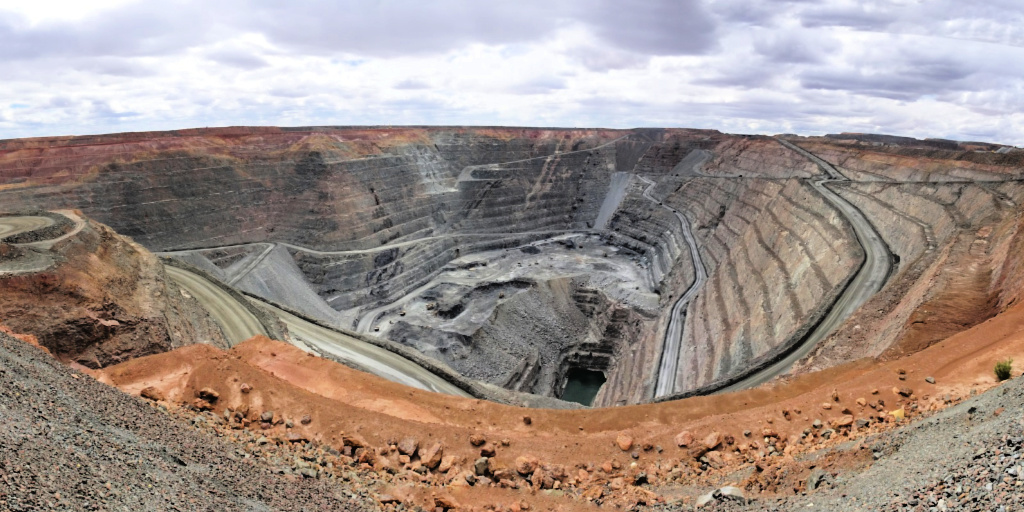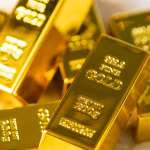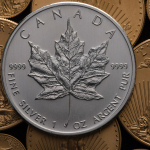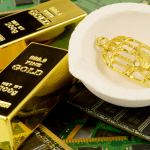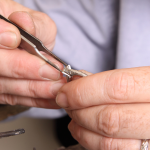While the concept of the Earth running out of gold may seem farfetched, it’s actually not. Let’s consider how it got here to begin with.
Where Gold Comes From
One theory many scientists believe is that precious metals, including gold, crash landed on Earth via meteorites that bombarded the planet more than 200 million years after its formation. When molten iron sank to the Earth’s center to form the core, it took most of the planet’s precious metals (and gold) along with it. Hot water trapped deep inside the Earth eventually cracked the planet’s solid-rock layer, releasing quartz-and-gold-filled veins.
That’s what makes the gold mining process so challenging. Gold located close to the surface can be extracted using open-pit mining techniques, while gold that’s located farther below the surface is excavated with underground mining methods. Areas where gold is concentrated enough to be mined profitably are far less common.
What Makes Gold a Precious Metal?
Well-known precious metals include silver, palladium, platinum and the most distinguishable one, gold. For a metal to be considered precious, it must be:
- Rare – A metal must be more difficult to find than other types of metals.
- Valuable – A precious metal’s rarity should give it economic value as an investment, art, jewelry and a commodity.
- Naturally occurring – Precious metals must be naturally-occurring compounds that can found on the periodic table of elements.
Let’s look at gold, more specifically. Unlike diamonds and other gems, gold can’t be artificially produced. It isn’t formed on this planet but exists in its natural state contained within the Earth’s crust. It’s what makes it rare. According to Gold.org, if we melted down all the gold ever mined throughout history (approximately 190,000 tons), it would result in a cube of pure gold that would measure roughly 68 feet on each side.
Running out of Gold
Since the planet has a finite supply of gold, running out of the natural resource is conceivable. According to US Geological Survey estimates, there is only about 52,000 tons of mineable gold still in the ground. Global gold mining, however, adds about 2,500-3,000 tons to the overall above-ground stock of gold each year. By those estimates, there may be only about 17 more years of underground gold left to mine.
Things, however, aren’t that simple. Gold reserves, for example, have remained unchanged since 1995—despite the mining of 2,500 tons of gold each year. That’s because new discoveries and old mine developments are keeping pace with current mine production.
If the thought of running out of gold is still unnerving, consider this: gold can be recycled. That’s why we can’t run out of gold like we would a non-renewable resource, like oil. If gold mines were to tap out the Earth’s natural supply, the gold industry would simply transition from mining to recycling.
Recycling Gold
Fortunately, we haven’t run out of gold yet. But why wait to start recycling? Because gold is so stable and valuable, it can be recycled with no degradation in quality and repurposed without the need for new mining.
According to the World Gold Council, at least 15 percent of the annual gold consumption is from recycled gold. In fact, if the world recycled less than 3 percent of the existing gold supplies, it could satisfy most of the global demand. Jewelers who sell their gold scrap contribute to the large amount of gold that re-enters the market each year via precious metal recycling.
Finding an Experienced Gold Refiner
Since 1985, businesses from all over the world have come to Manhattan Gold & Silver to sell their scrap gold lots. Scrap gold buyers are critical to the gold supply chain. About 1,000 tons of gold are recycled each year to meet annual market demands, which is higher than what is produced through mining alone.
If you’re selling your gold lot or any other kind of precious metal, contact us and learn how our refining services can put revenue back into your business. Gold, mining, gold recycling


